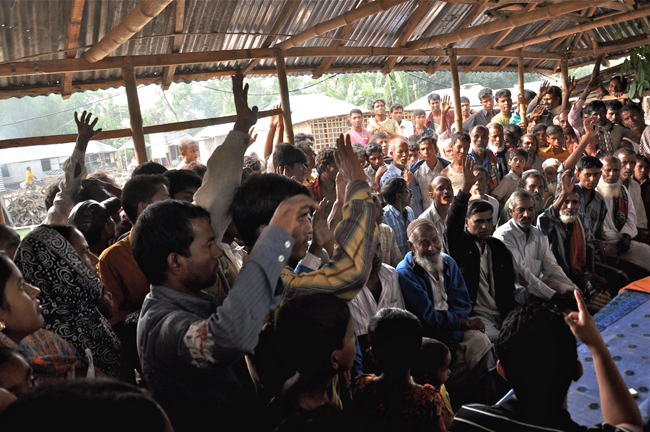 CARE Bangladesh has identified 'poor governance' as an underlying cause of poverty and exclusion in all its four impact statements. Decision-making power in formal institutions remains in the hands of the elites, despite the existence of electoral systems at various levels of government. This is because of the social inequalities that shape the exploitation, discrimination and marginalization of extremely poor people. Their participation is limited by their own lack of opportunity and capacity, societal norms and institutions, and centralized and exclusionary systems of governance. Resource allocation and access to these resources (the symptoms of poverty, as it were) are essentially shaped by power, incentives, political context and human capabilities. Therefore CARE Bangladesh's work focuses on addressing these dimensions of exclusion and inequity in the formal and informal realms and creating and strengthening spaces for participation, thereby creating the conditions necessary for extremely poor people to demand their rights and hold government to account.
CARE Bangladesh has identified 'poor governance' as an underlying cause of poverty and exclusion in all its four impact statements. Decision-making power in formal institutions remains in the hands of the elites, despite the existence of electoral systems at various levels of government. This is because of the social inequalities that shape the exploitation, discrimination and marginalization of extremely poor people. Their participation is limited by their own lack of opportunity and capacity, societal norms and institutions, and centralized and exclusionary systems of governance. Resource allocation and access to these resources (the symptoms of poverty, as it were) are essentially shaped by power, incentives, political context and human capabilities. Therefore CARE Bangladesh's work focuses on addressing these dimensions of exclusion and inequity in the formal and informal realms and creating and strengthening spaces for participation, thereby creating the conditions necessary for extremely poor people to demand their rights and hold government to account.
In order to address poor governance and unequal access to resources, a central premise of CARE's pro-poor, inclusive and participatory governance approach is that in order to eradicate poverty we must address both power relations and the resulting structural or systemic causes underlying poverty. Building on this conceptualization there are two important arguments for why governance matters. Firstly participation is seen as a right with intrinsic value in itself. Secondly, experience has taught us that development results are more relevant, far-reaching, and sustainable if people are able to engage in the management of those public affairs that affect their lives. Furthermore, there is evidence to show that there is greater success in reducing poverty and inequality in the long term if governments are capable, inclusive and accountable to their citizens and that people are able to actively engage in governance processes.
As an organization CARE Bangladesh has vast experiences of working with Union Parishad, the lowest governance structure of Bangladesh. It worked with the Local Government and Engineering Division on the development of infrastructure at union level. During 80's and 90's in Integrated Food Security Program funded by USAID, CARE Bangladesh implemented several projects (UPWARD, BUILD CAPACITY) with the Union Parishad, in which main focus was on capacity building of Union Parishads and developing the Union Parishad Complex to be served as 'one stop service centre'. Some other major projects include- SHARIQUE; Social and Economic Transformation of the Ultra-Poor (SETU); Empowerment of Local Actors and Non-State Actors in Responding to Economic Development Opportunities and Climate Change and Disaster Vulnerabilities project (PRODUCE); and Sustainable Access to Land Equality (SALE).
| Publication Date | Publication Title | Details |
|---|